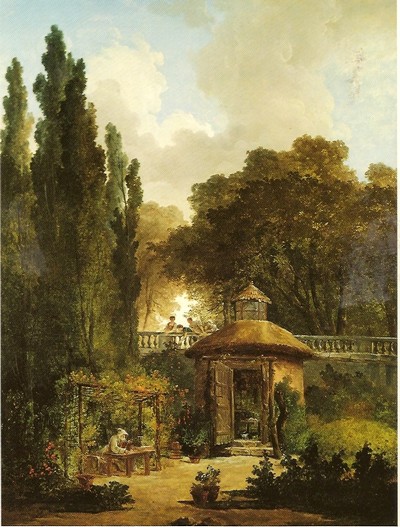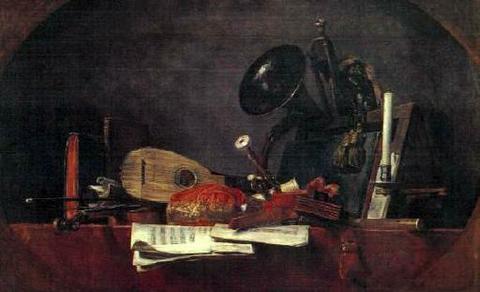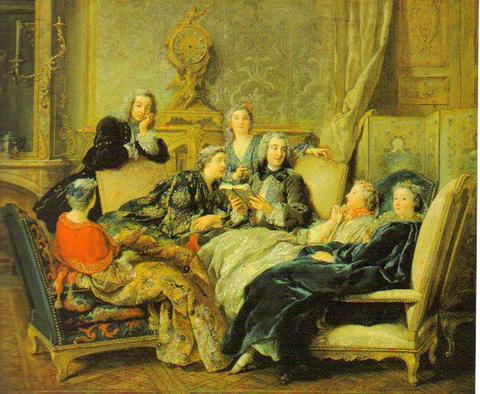Ellen and Jim Have a Blog, Too
We are two part-time academics. Ellen teaches in the English department and Jim in the IT program at George Mason University.


East Central 18th century conference, Georgetown (1): Spanish writers, the Duchess of Devonshire, Gluck, & Shakespearean allusion · 19 November 08
Dear Friends,
Jim & I enjoyed ourselves very much at the recent East Central meeting of the ACECS (American Society of 18th century Studies), and in order to remember the experience so that it will have been useful to me as well as memorialize a happy time, I have transcribed some of my stenography notes to create 2 reports on my experiences.
Thursday night was Peter Staffel’s “Oral/Aural experience,” where this time people were asked to read aloud select texts, Bob Malkevitch played effective 18th century music on the piano, and a group read aloud The Rape of the Lock. I was part of the latter group and read the closing lines by the narrator in Canto 5. Most people reading aloud emphasized the satire and hilarity of the poem, but if I wanted to, especially since I had the last peroration of the poem, I could read more seriously, slowly, lingeringly, and I did so to let the beauty, wit & rhythms of the verse’s words sink into listeners’ ears. The atmosphere in the room was strongly congenial and it was a great pleasure again to meet old friends in this session.
Friday was my longest day. I went to sessions in the early morning, went to the luncheon, sessions in the afternoon, and in the evening the banquet. On the way home that night I collapsed to the point I could barely drag myself into the house and into a bed. I am holding out against a similar overpowering strong tiredness just now as I work out this blog.
The topic for the conference, “The Eighteenth Century Political World” invited subjects which were not relevant to my research. Further, in the academy erasure of feminism & progressive deconstructionist proceeds apace, & the ACESC is not different from the rest of the community, and thus approaches (especially by graduate students and young scholars) are chosen which return to safe old-fashioned supposedly universal (or bland) “well-wrought urn” minute close readings whose subtlety or obviousness can be tedious while turning up nothing new. Thus this time I have notes for only a few of the papers.
The very first session (8:30 am) I attended was the only one where I took notes on all the papers: “1808 and the politics of the Hispanic Enlightenment.” Elizabeth Lewis’s paper, “The Politics of Women’s Charity in the Spanish Enlightenment” showed how women used the misogynistic customs around them to appeal cases before the courts. Enlightenment ideals had spread far enough to do this. Lewis’s favorite countess emphasized the importance of charity to spread the enlightenment ideals and lend women public spheres where they could function effectively. This use of charity extended through WW2. Mark Malin discussed the popular novelists in Spain, particularly the epistolary, Scott-like and radical novels of Estanislao de Cosca Vayo. Malin’s description of these novels made them sound very like the novels of Sophie Cottin, especially her Le Souterrain, ou Matilde (radical, feminine, sensitive). Catherine Jaffe discussed the active political work and enlightened ideals of matrimony in the writing of the Marquesa de Fuerte-Hijar’s El Eugenio, a translation-adaptation of one of Beaumarchais’s Figaro plays. She was supporting French values and literature (particularly in the salonieres) against Spanish (and also English and German) attacks that these were hypocritical affectations, conceding only (as the English did) to the (false) idea that French ideals were less deeply emotionally rooted than home-grown ones.

Hubert Robert (1733-1808), Hermit in a Garden (1790)
A curious obsession emerged in the discussion because it turned up in two of the papers and was alluded to in the third: women were apparently thrown into terrible prisons in Spain for sex “crimes” and well past the 1930s one still finds attempts to justify and create sympathy for women living in the abysmal terrifying and alienating prison conditions as a result of accusations of sex outside marriage and adultery.
It was in the 10:30 am session, “Eighteenth Century Characters,” that I heard one of several fine papers whose content I shall continue to profit from. In his “Politics & Patronage: Dr John Moore & the Duchess of Devonshire,” Henry Fulton added to my knowledge of Georgiana Spencer Cavendish’s life as well as startling me (and others) with reading aloud the aggressively nagging, nay bullying & implicitly threatening letters of the novelist-physician, John Moore, to the Duchess. Prof Fulton confirmed the portrait of the Duke in Foreman and the movie: an inarticulate selfish man who had no individual interests in life. He also confirmed that the Duchess was a soft, affectionate woman who needed emotional support. Apparently, the Duchess’s relationship with Moore has been overlooked until now: from the letters by Moore read aloud by Prof Fulton, I could again see how kind she was and thus susceptible to domineering determined personalities. Moore felt he had helped her become pregnant by his advice, and insisted she was strongly obliged to him, and therefore must find his sons places. I was not the only one in the room startled by his aggression and shameless demands. If this was an instance of the patronage system in the ancien regime, it was certainly a desperate rotten business.
Just before this session I got to talking with a friend who was reading Amanda Foreman’s biography and she showed me 2 poems by the Duchess which I reprint here as an addition to my foremother poet blog about the Duchess. The first is addressed to the baby girl she had by Charles Gray:
Unhappy child of indiscretion,
poor slumberer on a breast forlorn
pledge of reproof of past transgression
Dear tho’ unfortunate to be born
For thee a suppliant wish addressing
To Heaven thy mother fain would dare
But conscious blushes stain the blessing
And sighs suppress my broken prayer
But spite of these my mind unshaken
In present duty turns to thee
Tho’ long repented ne’er forgotten
Thy days shalllov’ d and guarded be
And should th’ungenerous world upbraid thee
for mine and for thy father’s ill
A nameless mother oft shall assist thee
A hand unseen protect thee still
And tho’ to rank and wealth a stranger
Thy life a humble course must run
Soon shalt thou learn to fly the danger
Which I too late have learnt to shun
Meanwhile in these sequestered vallies
Here may’st thou live in safe content
For innocence may smile at malice
And thou-Oh! Thou art innocent
I see in it how these pastoral myths of innocence in a valley (popular in the era, in French novellas, e.g., Shepherdess of the Alps) can work to console people. I also see in it the tone of Georgiana’s mind which appeals to me—a tone which also shows how she could be pressured and taken advantage of and why Bess Foster was a needed friend.
The second appears to be a rough translation by her of four
epigrammatic lines in the moral vein of the era:
Form but few projects, cultivate few friends
Content with little space, do good to all
and if alas, this happy system ends
the recollection, with no pain recall …
The Duchess probably suffered from depression; this is the psychological mechanism I call low expectations.
I left this session to hear two papers in another session, which was on opera. Alas, I was too late to catch the thesis of the first paper on Gluck’s Iphigenia in Aulis, and learned only (though it’s not only) that Gluck’s play is a re-creation of the (strongly feminist and humane) play of the same name by Euripides. The second speaker couldn’t get her music to play. From the discussion afterwards I learnt that Gluck’s Alcestis attempts to create theatrically thrilling dynamics on stage, and Diderot wanted lyric theatre to reflect the natural truth of the everyday world and when dishuitiemists speak of the developmentof naturalistic opera across the era they are referring not so much to the staging (Handel’s operas can be done naturalistically) as what is projected by the music’s harmonics.

Jean-Baptiste Chardin (1699-1779), Musical Instruments
Lunch was a salad I couldn’t eat (not having strong enough teeth for it) but I talked to a couple of very nice people, including Paul de Gaetano, and went for a walk with him afterwards to a bookstore. This year’s president, Doreen Saar gave a talk on her futile efforts to discover what George Washington ate for his inaugural dinner. She revealed what the process of scholarly research takes (what kinds of sources one goes to) and that in the earliest era of the US people did not idolize the president to the point of writing down carefully what he ate in his first public meal.
After lunch, I took more detailed notes on only 3 papers. In “Revolution, Colonialism and Political Theory” (2:15 pm) I listened to Erlis Wickersham give an informative paper on Lessing’s 1787 Emilia Galotti. She saw in this reworking of the Roman story of the murder of Virginia a call for enlightened reform of individual relationships; it’s apparently a radical Romantic closet drama German style of the type written in England in the 1790s and later by Byron and Shelley. A graduate student gave a paper which was a history of how 18th century philosophers looked at individual rights within societies (going over Kant, Byron, Shelley, Rousseau, Montesquieu &c), but he appeared unaware that all his cases were about how men relate to the state, and that there are two kinds of communities which come into conflict with individuals: the state and the family. Women were not permitted to connect to the state to try to assert rights but subject first to their families or husbands and thus were left out of this account. I cited Carole Pateman’s Sexual Contract to him, & it was only gradually that he intimated he understood he had left women out and had no interest in this history.
In “The Poetics of Politics” or “The Politics of the Canon” (4:15 pm), Sayre Greenfield gave a most suggestive talk about the use of quotations from Shakespeare’s works in the 18th century: it seems that using compendiums like Bysshe’s Art of Poetry people began to quote from Shakespeare’s plays as unquestioned repositories of wisdom. The way Sayre described the uses of quotation reminded me strongly of the way Simon Raven quotes from Shakespeare at key emotional or thematic moments of the Palliser series (Trollope does not) as a source for impeccable ironic understanding of the hardest crises and liminal moments in life. This session included a paper by a graduate student on Dryden’s Virgil where the student tried to showed how Dryden used translation very subtly to project his own politics; and a paper which was a defense of Pope’s Windsor Forest as not for but ambivalent about imperialism. I was not convinced but do think the richness of Pope’s intense verse has so many nuances you can argue a variety of political stances exist in it.
Inbetween sessions I caught up with the ongoing lives of old friends, and after they were over (around 6 pm) I met Jim at the bar, and we sat and drank and talked with different people until it was time to go into dinner. The dinner was pretty good and we did have enough wine to drink it down. Jim and I got into some good talk with Peter Staffel and his wife, Mary Beth, until the evening started to wind down, and we walked downstairs into the garage and drove home. During the day I had shared experiences with friends over this year. Compared “notes.” Central to the pleasure of a conference is to find yourself surrounded by people who are like-minded; who spent their lives the way you do, feel about things similarly to you or at least understandably. You find yourself in your own tribe.

Jean-Francois de Troy (1679-1752) The Reading from Moliere (1750?)
Friday night I’ll write my second report.
Ellen
--
Posted by: Ellen
* * *
Comment
- From Clare:
I've had time to read this report again. What a fascinating conference. I'd have loved to have heard the paper on Swift, as I've become really interested in him of late, since starting Nokes' book. It sounds as if you had a good time both intellectually and socially. I look forward to reading the second instalment. I'm off to a musical conference this weekend; however, the period isn't set. The lectures cover the whole gamut of classical music.
Dear Clare and all,
There was a Swift session on against "Politics of the Canon." I couldn't go to both.
I should say I write these reports as a way of making myself remember what was said and make sense of it. My blog is a place I can find and refer to to find what happened. Like diarists, to me I seem to live more and more fully by writing down what happened. It makes everything richer to think, to ask questions, to talk with others of it. I'd love to read other reports. It's a substitute for going!
Ellen
— Elinor Nov 20, 12:15pm #
commenting closed for this article
